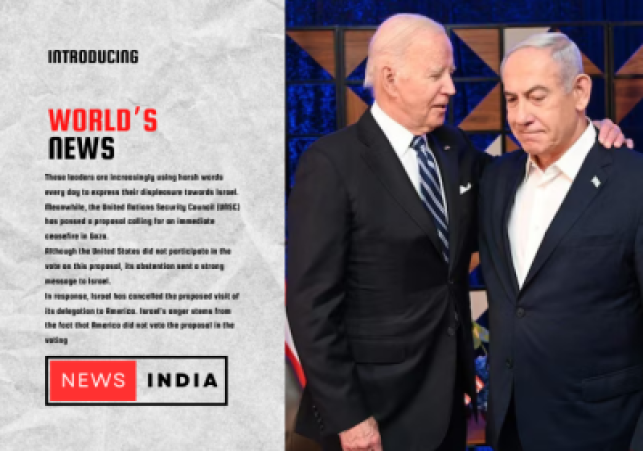Israel's support by Biden
Has America agreed to 'turn a blind eye' to its friend Israel?
For the past four weeks, there have been indications that senior officials of the Biden administration are increasingly losing patience with Israeli actions in Gaza.
These leaders are increasingly using harsh words every day to express their displeasure towards Israel.
Meanwhile, the United Nations Security Council (UNSC) has passed a proposal calling for an immediate ceasefire in Gaza.
Although the United States did not participate in the vote on this proposal, its abstention sent a strong message to Israel.
In response, Israel has cancelled the proposed visit of its delegation to America. Israel's anger stems from the fact that America did not veto the proposal in the voting.
However, recent events have raised the question: Is everything going well between the seemingly steadfast allies, the United States and Israel?
The significance of America's decision
The passage of the ceasefire proposal in the UNSC shows that President Biden has now decided that mere harsh words are not enough. This also highlights the tense situation between the White House and Israeli Prime Minister Benjamin Netanyahu. Netanyahu has reacted sharply to America's abstention, criticizing the U.S. for not vetoing the proposal. He argued that this had harmed his efforts in the conflict and the attempts to release the people taken captive by Hamas on October 7.President Biden and his top officials could respond to this statement with ingratitude. President Biden is quite close to Israel. He identifies himself as a Zionist. After the attacks on October 7, he provided emotional support to the Israeli people along with military and diplomatic aid.
Biden wants the release of the captives along with the end of Hamas. However, he wants Israel to do it "the right way.
Israel's support by Biden
Biden is making efforts to support Israel with prudence and compassion. Biden has pledged to stand firmly with Israel for their security, but he has also raised questions about some of Israel's harsh measures. He wants Israel to exercise caution in its actions and adhere to international laws and regulations. Promoting peace is also an objective of Biden's policy, in which he extends support to Israel. This sensitive and harmonious aspect of Israel-U.S. relations can be understood.
During the initial weeks of conflict between Israel and Hamas, President Biden warned Israel not to become blinded by revenge, as America did after the Al-Qaeda attacks on September 11, 2001.
After the Hamas attacks, the American President visited Israel, met with all the affected families, and embraced Netanyahu. It's noteworthy that relations between Netanyahu and Biden have never been so easy.
Secretary of State Antony Blinken, who has visited Israel seven times since October 7, has consistently urged Israel to respect international humanitarian laws, including the duty to protect civilians.
At the onset of the conflict, Israeli Prime Minister Benjamin Netanyahu promised his people that they would "avenge" Hamas attacks. Since then, over 30,000 Palestinians have been killed in Israeli attacks, most of whom were civilians. The United States provided many of the weapons used in these attacks. The United States provided many of the guns used in these attacks.
The reason for Biden's displeasure?
With destruction in Gaza, increasing risk of famine among the people of Palestine, and concerns about Rafah in southern Gaza due to Israeli actions and the fear of deaths, it is believed that President Biden has concluded that Israel has crossed the line of ignoring his advice.
Israel claims that it has always adhered to the laws of war. Israel has also dismissed allegations of obstructing humanitarian assistance to the people of Gaza.
But now, there is a flood of evidence showing that Israel is not telling the truth. Just a few kilometres away from the food and drink supplies in Israel and Egypt, small children are dying of hunger.
The evidence presented by American and other international was passedorganisations and aid agencies shows that. Gaza is on the brink of famine.
The U.S. military is dropping aid while essential supplies are delivered by sea to Gaza. However, Israel, located half an hour away from northern Gaza at the Ashdod port, is allowing very little of this aid to pass through.
Attempting to improve its image
More than 30,000 Palestinians have lost their lives in Israeli actions so far. After several unsuccessful attempts in the United Nations Security Council, a proposal for a ceasefire in Gaza is pass on Monday. This proposal was able to pass because the United States did not veto it, which was a departure from its previous stance.
The United States did not participate in the voting on Monday. China brought this proposal.
However, the reason for Israel's anger is the absence of a U.S. veto in the voting on this proposal.
However, the White House has said that not participating in the voting process does not signify a change in America's policy. White House spokesperson John Kirby also said that America will discuss this decision with Israel.
By not vetoing the resolution on the Ramadan ceasefire, America has tried to relieve itself from the accusations of being responsible for Israel's activities.
After Benjamin Netanyahu rejected the Biden administration's proposal to resolve this crisis, America made this decision in the Security Council.
America is trying to show that Israel also has a limit to the international pressure it can withstand.
It is generally believed that proposals passed by the Security Council are binding under international law. Now, Israel will have to decide whether it will respect this proposal, which Hamas and Palestinians have welcomed in the U.N.
Netanyahu's coalition government depends on the support of extreme Jewish nationalist extremists, who will ask Netanyahu to overlook the proposal. If Netanyahu does so, America will have to respond.
However, President Biden's most significant power is the supply of weapons to Israel. Large shipments of weapons used in the war have been supplied to Israel from the United States. Moreover, Israel is advancing its plan to expand the war with the help of this support.
The deep relations between America and Israel date back to 1948 when then-President Harry Truman recognised Israel as an independent country just 11 minutes after its formation. However, their relationship has remained tense on several occasions.
Crises arose when Israel acted against the wishes of American presidents and harmed Israeli interests in their view.
This is not the first time Benjamin Netanyahu has angered an American president. Since becoming Prime Minister for the first time in 1996, he has been doing so.
But his opposition to America has never lasted for long, never been so tense, or caused such a crisis in US-Israel relations as seen in the past six months of the Gaza war.



.png)

.png)
